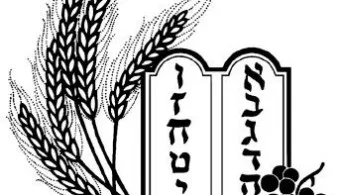Passover is the classic Jewish celebration: “Our enemies tried to kill us; God delivered us; let’s eat.” Shavuot not so much. It’s traditionally known as Zeman matan Toratenu—the season of the giving of our Torah—and at the giving of Torah the universal purpose of God’s particular rescue of Israel takes center stage. On Shavuot, the Lord tells Israel:
Now therefore, if you will obey my voice indeed, and keep my covenant, then you shall be my own treasure among all peoples; for all the earth is mine; and you shall be to me a kingdom of priests, and a holy nation. Ex 19:5–6Passover is particular—Shavuot is universal.
The earlier part of Exodus, leading up to Passover, emphasizes the particularity of “Israel my son, my firstborn” (4:22). After Passover the focuses widens. Israel, says the Lord, is “my own treasure among all peoples.” Israel has particular value, but all peoples come into view, “for all the earth is mine.” And then comes a universal calling as the Lord calls Israel “a kingdom of priests.” This kingdom is raised up to benefit all the rest of the kingdoms. Israel doesn’t remain in isolation in the wilderness at Sinai, but will be led into the Promised Land, one of the most public and exposed intersections of the entire ancient (and modern) world. There Israel has a leading role in the story of the whole human race. As the modern commentator Nahum Sarna notes,
The priest’s place and function within society must serve as the ideal model for Israel’s self-understanding of its role among the nations. The priest is set apart by a distinctive way of life consecrated to the service of God and dedicated to ministering to the needs of the people.So if all Israel is a priestly kingdom, who are “the people” to whom Israel ministers? The nations of the world. And what is the role of the priest? The prophet Malachi answers that question:
For the lips of a priest safeguard knowledge,This is Israel’s mission among the nations. After his final Passover, Yeshua hands off that mission off to his followers, but he tells them they will first be endued with power from on high—the Ruach, which will be poured out on Shavuot. The account of this outpouring in Acts 2 highlights its universal aspect:
And people seek Torah from his mouth;
For he is a messenger of the Lord of Hosts. Malachi 2:7
- The Jews who are present for it are “devout men from every nation under heaven” (Acts 2:5), speaking all kinds of different languages (2:8-11). Since the Jewish people constitute a kingdom of priests, we can see this worshiping multitude as representing the various nations from which they have come.
- Peter explains what’s going on by citing the prophecy of Joel, which opens with God’s promise, “I will pour out my Spirit on all flesh” (2:17). The apostles might have thought this meant all Jewish flesh, but the Book of Acts reveals that this is a universal promise.
- Peter wraps up his explanation with this: “For the promise is for you, for your children, and for all who are far away . . .” 2:39). Again, he might have been thinking of all the Jews who were far away, but we soon see that God has a different interpretation.
The particular salvation of Passover blossoms forth into universal promise on Shavuot. Messiah Yeshua brings both the salvation-deliverance of Passover and the universal promise of Shavuot to fulfillment.
Now, “particular” and “universal” are fancy words, and we need to get more personal with this: Does my particular relationship with God, my personal spiritual experience, convey a priestly benefit to those around me? Especially those outside the Yeshua-believing community?
Years ago, in my early days as a follower of Yeshua, I was the director of a Christian drug rehab center, which was housed in a former Catholic boarding school. One day one of our neighbors dropped by, wanting to talk with me. As he began to tell his story, he asked me if I was a father. I already had three or four children at the time, so I said I was, and he continued, “Well Father, here’s my problem . . .” This guy thought I was a Catholic priest, and what he was really saying was “I need a priest.” He might not have normally gone to any church, and probably didn’t think all that much about God, but something had come up in his life that made him realize, “I need a priest.” And it made me realize, “that’s me.” I let him know that I wasn’t a priest in the Catholic sense, but I also offered to help. In the years since, I’ve run into lots of people who were saying “I need a priest.” They not only need God (and finally realize it), but they need help in accessing God and God’s word—and that’s where I fit in.
We often glory in our life-changing encounter with God, this intimate, undeniable, independent-of-circumstances meeting with Messiah Yeshua that changed our lives forever. In Messiah God provides a personal Passover deliverance from bondage and oppression. And this particular deliverance blossoms into the universal on Shavuot. I’ve been set free in Messiah Yeshua, but I can’t leave it there—it’s meant to become universal, conveying a priestly benefit to those around me. As we get ready to celebrate Shavuot, let’s remember that it’s a celebration meant to mobilize us to be the answer to those who are saying or thinking, or even just barely sensing, “I need a priest.”
For the lips of a priest safeguard knowledge,Hag Sameach–a Joyous Shavuot! - Rabbi Russ Resnik
And people seek Torah from his mouth
For he is a messenger of the Lord of Hosts.

Comments
Post a Comment
Your comment has been received. Thank you.